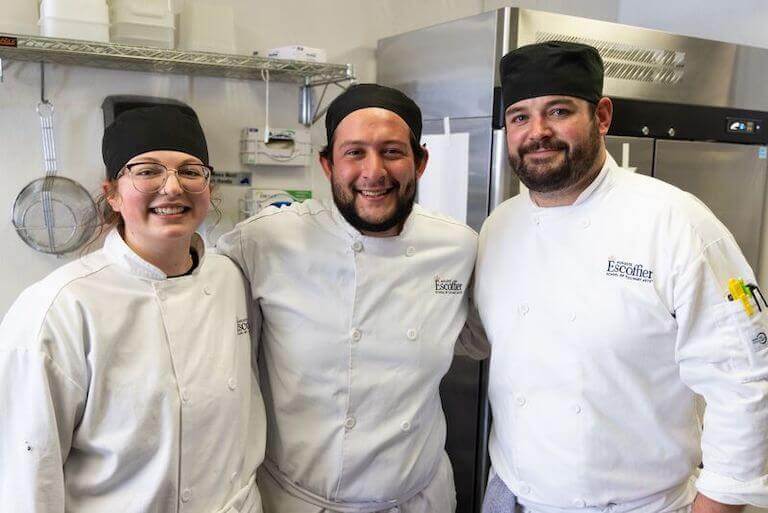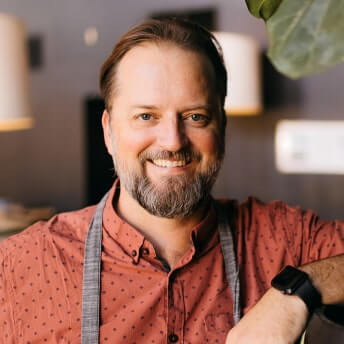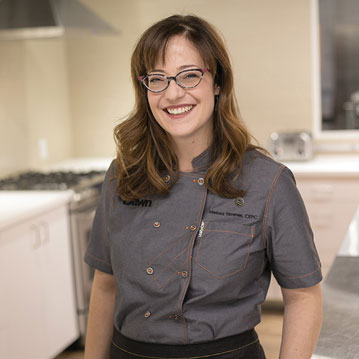Quick and precise knife skills, the ability to develop complex flavors, and calmness under pressure are just a few signs of a great chef. Along with possessing certain skills and characteristics, professional chefs also know how to keep up with culinary trends and push the envelope on creative culinary endeavors.
The question is how do these professionals stay up to date on the latest developments in the culinary world and keep their creative juices flowing? To put it simply, they never stop exploring. They turn to top chefs from the past, modern cookbooks, and their peers’ restaurants to fill their minds with new ideas and keep their food interesting.
To Understand Current Culinary Trends, Professional Chefs Look to the Past
While many current culinary professionals turn to the work and teachings of Auguste Escoffier to learn classic French techniques, Escoffier was once a culinary trendsetter himself.
Escoffier started his culinary career by working in kitchens and learning the fundamentals. However, even from these early days, he had the ambition to push his food to the next level. As he advanced through kitchens, he began to try out new techniques and experiment with novel dishes.
Despite Escoffier’s confidence, he faced much criticism and many doubts from others when implementing systems like the brigade de cuisine and options like a la carte menus. However, he held strong in his beliefs, and before long his methods became local trends, eventually adopted by restaurants throughout the world.
“One of my hallmarks has never been to chase the same thing over and over again. I’ve gotten caught in it a few times, but never chase that same dish over and over again because it’s never the same.”*
Erik Niel, Co-owner & Executive Chef at Easy Bistro & Bar and Main Street Meats
So what can modern professional chefs learn from Escoffier? First, don’t skip the fundamentals. By becoming skilled at culinary basics, you are better able to tackle new techniques and weave creativity into the kitchen. That’s why Escoffier students start their culinary arts programs by focusing on subjects like knife skills and mise en place.
Second, don’t be afraid to experiment! Professional chefs know how to take their knowledge of ingredients and techniques and get creative. While they’re bound to experience some failures, experimentation has been the catalyst for more than a few culinary trends.
They Network With Other Culinary Professionals
One major way top chefs keep up with new cooking techniques, popular flavors, and trending ingredients is by talking with other professional chefs. They typically don’t just read about these chefs online or in a magazine—they often reach out and connect one-on-one.

Culinary school allows students to network and share ideas.
Of course, these connections don’t just pop out of thin air—chefs often need to put in some work to establish these relationships and keep them going. For example, many professional chefs hop between several different restaurants as they improve their cooking skills and move up through the ranks. During this time, they may connect with tens or even hundreds of other people interested in food. What may have started as a relationship with another line cook early on in their career could eventually lead to a close connection with an award-winning chef.
And even when chefs near the top of the culinary ladder, they still often realize they can learn from everyone around them. Just ask Master Chef Daryl Shular. “I think that a lot of times we get in our shell and we don’t want to listen to the people around us, but I think you have to be open to that and become what I call that global citizen, and learn everyone’s story and point of view,”* Shular said. After all, anyone could be holding the secret to the next great cooking trend.
“Being part of the Escoffier school is being part of a large family. You can go to all sorts of fabulous schools but you don’t have the sense of belonging to a group or family.”*
Michel Escoffier, Great-grandson of Auguste Escoffier and President of Escoffier Advisory Board
Other times making connections requires a bit more upfront effort. If a chef admires another chef’s food, they may want to know more about how they cook. Rather than just reading up on them online, the chef may be able to leverage their status or connections to obtain an in-person meeting or phone call with the chef.
Professional chefs also take every opportunity to visit other restaurants, to both taste new food and talk with the staff. This means they may see every meal at home and every visit to a new city as an opportunity to keep up with what’s new and trending in the culinary world.
They Read Cookbooks and Food Concept Books
While reading a cookbook may seem like something a home cook would do when they’re looking for ideas for dinner, these books can also provide insight into the minds of other professional chefs. Many modern cookbooks not only contain recipes, but also provide snippets of information about topics like ingredient sourcing, flavor combinations, and the story behind how a chef came up with a particular dish.
If you visit the home or restaurant of a professional chef, you’re likely to see stacks of books written by chefs who have led their restaurants to Michelin Stars or have received awards such as the James Beard Award.
Along with cookbooks, chefs often turn to books that focus on topics like flavor development and modern cooking techniques. For example, The Flavor Bible exposes chefs to often overlooked ingredient pairings and Modernist Cuisine explains the science behind processes such as caramelizing meat and creating foams.
They Connect with Food Professionals Besides Chefs
It’s easy for chefs to become sucked into their own little restaurant bubble and only bounce ideas off of sous chefs and prep cooks. And even if a chef does connect with chefs at other restaurants, they could still be missing out on a lot.

Escoffier students talk with a farmer during the Farm to Table Experience.
The best chefs know that the food world consists of many people besides chefs, and they’re not afraid to reach out to these other professionals.
By regularly talking with or reading the words of farmers, food stylists, specialty food buyers, and food bloggers, chefs can stay up with ingredients coming onto the market as well as keep up with what consumers are interested in. That means you’ll often see professional chefs shopping at farmers’ markets, grabbing a pass to a specialty foods convention, and establishing a reading list of food blogs and publications.
They Look to Younger Generations
While trends can come from all age brackets, chefs know the youngest often lead the way. So no matter their age, chefs often pay attention to current youth and young adults and take note of what they care about.
A great place to start is social media. When chefs notice a certain topic is trending on Tik Tok or Instagram—sustainability, for example—they know there’s a good chance it will make its way into the culinary world sometime soon. That means they may focus on sourcing locally or begin to explore ways they can further reduce their restaurant’s food waste.
However, they also know how to pick through trends and utilize what works with their own cooking style.
“A lot of it is social media now. Who are you following in your feed? Who is interesting? What has staying power? There are some trends that are really fun for social media but maybe aren’t practical.”*
Melissa Trimmer, Corporate Executive Chef at Dawn Foods
Build a Strong Foundation and Network at Culinary School
While professional chefs make it look like keeping up with culinary trends is easy, the truth is that it takes a lot of work and dedication. If you’d like to one day join the ranks of these chefs, it may be beneficial to start with a strong understanding of culinary basics. Culinary school can provide you with an overview of basic skills and techniques and a supportive environment where you can practice your skills.
Interested in joining the Escoffier family? Contact us today for more information about our available programs.
To keep learning, read these articles next:
- The Difference Between a Cook and a Professional Chef
- What Does It Mean to Be a Professional Cook?
- How to Become a Chef: The Complete Guide
*Information may not reflect every student’s experience. Results and outcomes may be based on several factors, such as geographical region or previous experience.
This article was originally published on July 26, 2018, and has since been updated.

 “One of my hallmarks has never been to chase the same thing over and over again. I’ve gotten caught in it a few times, but never chase that same dish over and over again because it’s never the same.”*
“One of my hallmarks has never been to chase the same thing over and over again. I’ve gotten caught in it a few times, but never chase that same dish over and over again because it’s never the same.”* “Being part of the Escoffier school is being part of a large family. You can go to all sorts of fabulous schools but you don’t have the sense of belonging to a group or family.”*
“Being part of the Escoffier school is being part of a large family. You can go to all sorts of fabulous schools but you don’t have the sense of belonging to a group or family.”* “A lot of it is social media now. Who are you following in your feed? Who is interesting? What has staying power? There are some trends that are really fun for social media but maybe aren’t practical.”*
“A lot of it is social media now. Who are you following in your feed? Who is interesting? What has staying power? There are some trends that are really fun for social media but maybe aren’t practical.”*